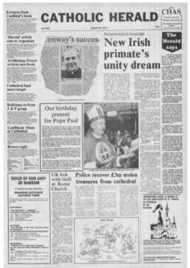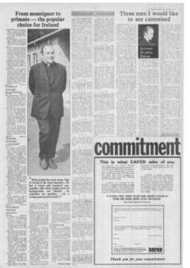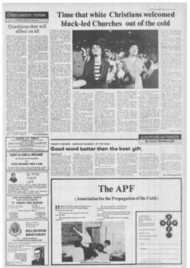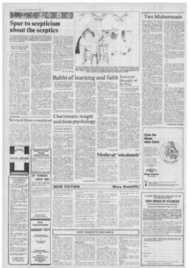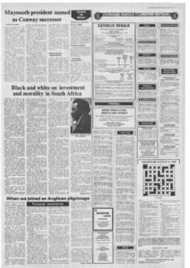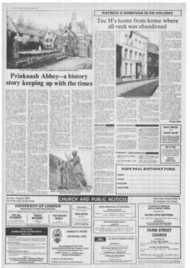Page 5, 26th August 1977
Page 5

Report an error
Noticed an error on this page?If you've noticed an error in this article please click here to report it.
Tags
Share
Related articles
Christians And The Nf
White Church Or Black?
Race On Churches' Agenda
Catholic Schools Must Take A Lead In Racial Integration
Answering Rome's Call For An End To Racism
Time that white Christians welcomed black-led Churches out of the cold
AFTER two decades of virtual isolation from the major British Churches, the predominantly West Indian and African ethnic minority Churches — "the black-led Churches" — may soon come into the mainstream of British Christianity.
Discussions are under way between the British Council of Churches and Black Church leaders aiming at "a genuine partnership based on mutual spiritual acceptance."
Since the late 1950s, these congregations have become a major phenomenon within the nation's religious life. As with many other aspects of ethnic minority life, it has been virtually ignored by the white majority.
Size alone would demand that we take note of these Churches. While no precise statistics are available, it can be reliably estimated that some 120,000 to 150,000 people of Caribbean or African background worship regularly in black-led Churches in Britain.
While actual baptised membership is certainly less than this, others who rarely attend worship are reached by these Churches' evangelistic and social out-reach, youth work and community action.
Several hundred ethnic minority places of worship are now established, especially in the major cities, but also in many smaller towns. Some own their own churches (often former "mainstream" churches sold off as congregations dwindled): others rent premises or meet in community halls.
Additionally, an untold number of house churches and independent home-based Bible groups are active. Their clergy usually have secular lobs.
A small number of independent Indian Christian congregations, and the growth of Greek Orthodoxy in Britain following the Cypriot influx, are also part of the ethnic minority religious picture.
Of course, some of the "New Britons" have joined the longestablished Churches and become active members. Multiracial Anglican and Free Churches, as well as Catholic ones, certainly exist in inner city and suburban areas which have become multi-ethnic in re cent years.
It is also a well-known practice for some West Indians to attend both a mainstream church and the local independent black congregation.
Furthermore, Catholic congregations, with their strong sense of the Church Universal combined with the English Catholic heritage of being for a long time largely an immigrants' Church, have found it easier to hold Afro-Caribbean Catholics.
Outside Catholicism, only the Seventh Day Adventists have had similar success.
But the fact must be faced, particularly by the Anglican and Free Churches that independent black-led congregations grew, and whole new ethnic-minority denominational structures became established throughout the 1960s and early 1970s, as many West Indians and others experienced rejection by the established white congregations. Although there are many exceptions to this generalisation, and although black Church leaders will testify to many instances of welcome and friendship by individual white Christians arid particular congregations, the predominant experience was one of being "frozen out", and led directly to the independent Black Church movement.
The Rev Martin Simmonds, of the First United Church of Jesus Christ Apostolic. comments frankly: "The widespread of black-led Churches in Britain today is owing to the hostile attitude of the indigenous towards the ethnic minority when we first arrived. We were literally driven away from the established Churches — Churches to which we were adherent in our native land."
The Rev David Douglas, minister of the Jamaica Council of the Churches of God and leader of a black Pentecostal Church in Watford for 20 years, testifies to West Indian Christians being "slighted, rejected, treated coldly, and sometimes openly told to worship elsewhere."
Early attempts by immigrant Church leaders to liaise with clergy and Church leaders in Britain gut virtually nowhere, except for isolated local initiatives.
Almost unnoticed by the British Churches, whole new denominations came into being such as the New Testament Church of God, the Church of God or Prophecy, and the Apostolic Church of Jesus Christ.
These, and a bewildering variety of smaller bodies and independent congregations, Form the major expression of the West Indian Christian experience in Britain today. Churches of African derivation, such as the Aladura Inter national Church, are also active for their ethnic group.
In the Evangelical Protestant theological stream, such Churches are predominantly Pentecostal in their worship and churchmanship. Significantly, it is usually a Firstgeneration Pentecostalism.
Most ethnic-minority Christians came from historic British missionary churches,
Bishop Malachi Ramsey, of the Shiloh United Church of Christ (Apostolic) explains: "in the West Indies most of us were not Pentecostalists, but Baptists, Methodists, Anglicans and Presbyterians.
"Most of us have become Pentecostalists and organised our own churches, since we came to Britain. Pentecostalism is now one of the strongest organisations actually governed by black people in this country.
"Black Pentecostalism is not a separatist religious force —
we extend fellowship to all tit ristians — but we've been bitten and become sensitive, and the wounds will take a long time to heal."
it is to achieve such a healing in a spirit of true across racial and cultural boundaries, that hacumenism le recent developments have occurred. The British Council of Churches' 1976 report on "The New Black Presence in Britain" advocated closer fellowship with the "newly established Churches".
A consultation between the British Council of Churches and black Church leaders at Dartmouth House last September, followed by a major conference of representatives or black-led Churches at Luton in October, led to a joint working party being set up, with consultant-observers being invited from the Catholic and Seventh-Day Adventist Cht g ujsraehe aes.
nd sharing of Church buildings. and "possibilities of mutual exchange in the spirit ual and educational resources available in the churches" are key agenda items.
Help with ministerial and lay training, access to the Churches' educational resources, financial loans to provide needy congregations with basic premises for worship and community care — such are present priorities if the black Churches are to take equal place alongside the chistoricg Bt,ItitsihieChRuer‘c. hrvet . osahceSephula. joint working party chairman with the Anglican Bishop of Willesden.
Sephula, minister and presiding elder for the United Kingdom of the African Methodist Episcopal Church. a a nun-Pentecostalist body with a massive following in the United States, believes the public emergence of strong black Church leadership, in association with the BCC, could he decisive for good community relations in Britain.
Certainly, it is high time the black-led Churches came out of the cold, and were given public recognition and true ecumenical partnership by while Christians — whether Anglican, Free Church or Catholic.
Brian G. Cooper
blog comments powered by Disqus


